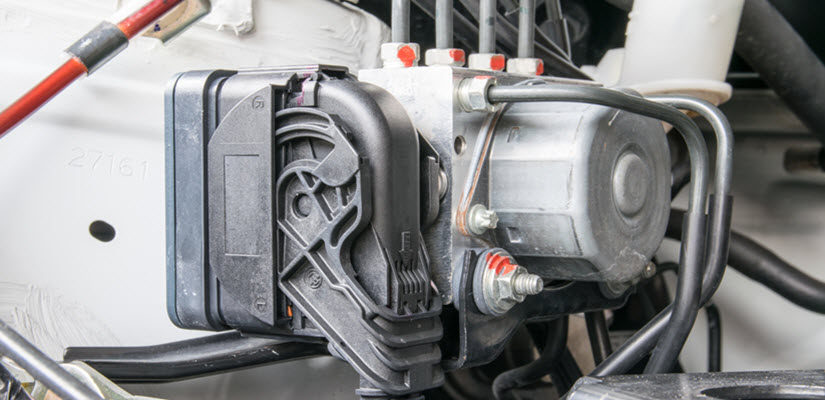How to Deal with Volkswagen ABS Module Failure
By Bavarian Performance Specialists May 24, 2018
In today’s vehicles, nearly every system and part is ultimately controlled by a technological component. Recent model Volkswagens have been steadily incorporating technology into their vehicles for decades, making them one of the leading trail blazers in the automotive industry. Unfortunately, like all mechanical and technological designs, parts fail and require repair or replacement. One such part that commonly fails in Volkswagen cars is the ABS module. If you’re not sure what the ABS module does for your VW, you’re not alone. In this article, we’ll go over the basic idea of the ABS module, what to look for when it isn’t functioning properly, and what you can do to keep this from happening in the future.
What Does the ABS Module Do for Your Volkswagen?
ABS stands for anti-lock braking system—a component that all new vehicles are equipped with. Anti-locking brakes were designed to keep the wheels from seizing when the brakes have to be applied fast and hard, allowing the car to come to a full and complete stop without hydroplaning or skidding at all. There are different components of the ABS, including various sensors on each wheel and the module itself. The sensors relay information about the wheel speed back to the module, which makes adjustments to the braking system effectiveness. When the ABS fails, whether it’s due to sensor, module, or electrical failure, it’s critical to have the problem addressed by a Volkswagen professional immediately.
Signs that Something Isn’t Right
Part of obtaining an accurate diagnosis is paying attention to how your VW is behaving recently. Your brakes are critical for your safety, and any problems with the ABS should be taken seriously. You can certainly catch ABS issues before total failure, but it’s important to know what to look for:
ABS Light
Various systems in your car have warning protocols to alert the driver of a system failure or error. The ABS is no different. Rather than the oil light or the check-engine light, the ABS light will alert the driver and the automotive specialist that there is an issue related to the anti-lock braking system, allowing them to trace it back to the module.
Brake Pedal Feel
If you notice that your brake pedal is more difficult to press down than usual, or if the brake pedal is not responding as quickly as it should, then there could be an issue with your ABS module.
Brake Behavior and Performance
If the ABS module isn’t performing well, then you’ll notice a significant difference in your car’s braking capabilities. When the module fails, it is common to experience erratic brake behavior, including locking brakes.
What You Can Do to Prevent ABS Module Failure
Since the Volkswagen manufacturer is aware of the tendency for the ABS module to fail, they have taken precautions in their maintenance instructions. While it certainly helps to follow the recommended maintenance plan for your car, this alone doesn’t prevent ABS module failure. Besides simply following the routine maintenance plan, it’s also important to work alongside a VW professional who knows your specific car, driving habits, and driving conditions. Performing frequent inspections and following through with concerning symptoms can keep your automotive specialist in-tune with your car’s aging process, and adequate repairs can keep your car performing optimally for years to come. Finding the right automotive specialist for your Volkswagen is the first, and most important, step toward ensuring your VW’s longevity, durability, reliability, and safety.
How We Can Help You
 The Volkswagen experts here at Bavarian Performance Specialists have provided exceptional, tailored services to clients from all over the areas of Thousand Oaks, Agoura Hills, Westlake, Malibu, and Newbury Park, CA since 1983. Our clients love to drive down the coast, enjoying the long sweeping roads California has to offer, and it can be especially disheartening when you’re constantly worried about ABS module failure in your VW. ABS failure is highly unsafe, and it’s important to follow through with any concerning symptoms immediately. To schedule an inspection or to learn more about our qualifications working with German vehicles such as Volkswagen, please contact one of our helpful professionals directly. We look forward to ensuring your safety and restoring your VW!
The Volkswagen experts here at Bavarian Performance Specialists have provided exceptional, tailored services to clients from all over the areas of Thousand Oaks, Agoura Hills, Westlake, Malibu, and Newbury Park, CA since 1983. Our clients love to drive down the coast, enjoying the long sweeping roads California has to offer, and it can be especially disheartening when you’re constantly worried about ABS module failure in your VW. ABS failure is highly unsafe, and it’s important to follow through with any concerning symptoms immediately. To schedule an inspection or to learn more about our qualifications working with German vehicles such as Volkswagen, please contact one of our helpful professionals directly. We look forward to ensuring your safety and restoring your VW!
* Volkswagen Golf GTI 35th image credit goes to: supergenijalac.





